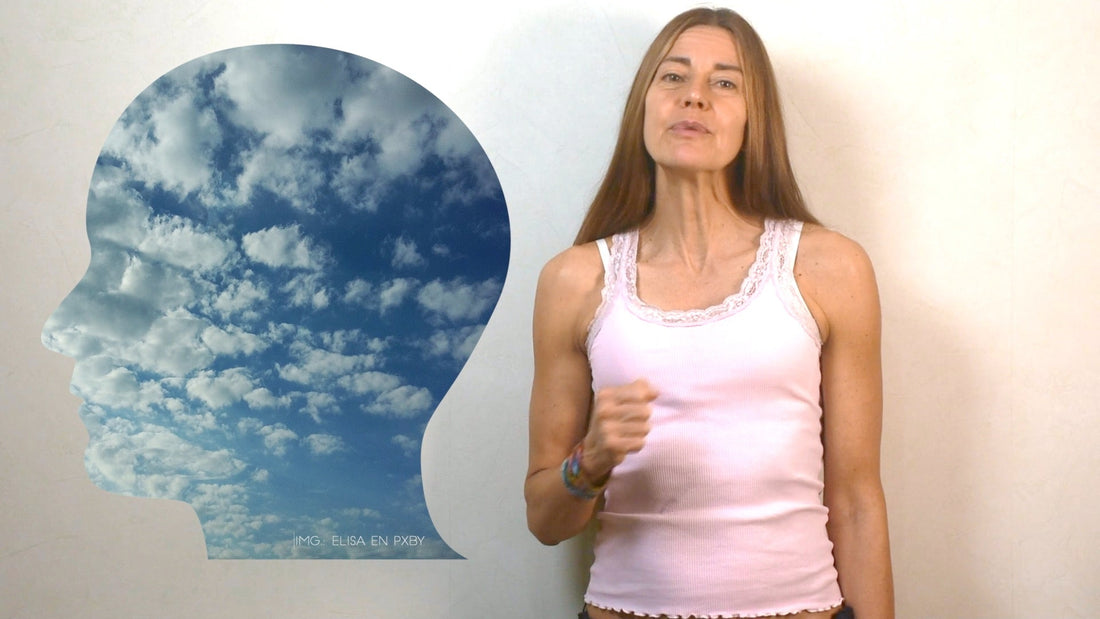
HOW TO MAKE YOUR BRAIN GENERATE WILLPOWER
Share
In general, our daily life is made up of automatic and unconscious activities, but situations arise that require an effort or controlled will (intention), such as when we try to solve a problem (academic tasks), keep our attention focused on infrequent signals (efforts that require vigilance), suppress impulses (self-control), or perform an exercise at an uncomfortable intensity (sports and rehabilitation situations).
Controlled effort or will results from the drive mechanism anchored in the salience network that includes the dorsal anterior cingulate cortex and the inner insula.
The anterior cingulate cortex, and specifically the anterior cingulate gyrus, is part of an executive attention network, and its main function is to regulate the processing of information in the brain from other networks, both in sensory and emotional modalities (Öschner & Gross, 2005) .
Thus, the anterior cingulate cortex is the part of the cerebral cortex responsible for being involved in the predictions that our own brain makes about the results of certain behaviors and helps it to execute that behavior, that is, to put its willpower into action. But is it possible to “train” this area of the cerebral cortex to do something we set out to do?
A study published in the journal Frontiers in 2022 proposed a model to test whether training willpower was feasible. The author of the model ( Baumeister et al., 2007 , 2018 ) was perhaps the most suitable person to do so since he had co-authored the best-selling Willpower: Rediscovering the Greatest Human Strength in 2011.
Taking the muscle metaphor, Baumeister's model assumes that regular exercise of self-control (self-discipline) can improve willpower and endurance, just as training can strengthen muscles.
The results indicated that physical and mindfulness exercises appear to be two promising training methods that deserve to be included in self-control training programs.
It's not just about willpower
According to the same Frontiers article, people who have a high capacity to exert controlled effort or volitional capacity are more likely to perform better in work, school, and sports situations that require controlled attention or self-discipline (self-control).
However, as a BBC article mentions, “some of the greatest achievements of our civilization have been founded on qualities such as creativity, imagination, curiosity and empathy.”
And yes, it turns out that these characteristics make up what science has called “cognitive flexibility.” This is the ability that allows you, as a human being, to switch between different concepts or adapt your behavior to achieve goals in a new or unstable environment.
According to these parameters, your willpower, instead of being an unmovable arrow of action, should navigate through the vicissitudes and difficulties of life that could require modifications on your part in order to achieve the purpose you have set for yourself.
So what comes first, purpose, willpower or cognitive flexibility?
In my opinion, and based on my much or little experience, once you set a goal, it requires your willpower or self-discipline to stick to your purpose and the cognitive flexibility to make the corresponding adaptations, according to the circumstances, but without losing sight of your goal and the motivation that has led you towards it.
It is about learning to learn and being flexible in the different ways of receiving new learning.
Over time I have become convinced that humans are lifelong learners and this refers to the attitude with which we face life:
First , a certain humility in understanding that we do not know EVERYTHING and that each day has lessons for us, but also, a willingness to be open to learning and to continue being amazed by discovering what the world shows us.
Second , detect and accept that if something we are doing is not leading to success, react in time and make the relevant changes. This includes taking the initiative and looking for strategies that will redirect us to the path we want to follow.
Third , don't cry over spilled milk. Instead of creating a drama or blaming others and getting angry when faced with an adverse situation, use that time to resolve the situation as quickly as possible and in the best way possible.
Fourth , we are in a time when we confuse the concept of happiness with that of pleasure. Feeling fear, sadness, guilt, disgust are emotions that make up the adaptive responses of our brain. Paraphrasing the psychopedagogue Mar Romera: “If you feel fear when you are in a dark place at night, that feeling can save your life. If you feel guilty about something wrong, that puts you on the platform for reparation; feeling rejection towards alcoholic beverages, for example, that will help you have the clarity to reject things that are harmful to your body.”
According to Romera, we need to experience ALL emotions in order to train them, as if we were in a gym.
The same goes for your brain. You need to go to this gym of different emotions, not just one. You can't just go to the nice massage parlor. You have to experience EVERYTHING and take responsibility for your actions. In short, you have to be brave. ( article )
5 ways to boost your willpower
"You won't always be motivated, so you must learn to be disciplined."
Here are five ways I suggest you boost your willpower and motivate yourself to strengthen your middle anterior cingulate cortex, or, as they say, to build, to familiarize yourself with your self-discipline, and to awaken in you the confidence to use this important tool whenever you need it:
Keep your life purpose in mind . When you focus on your purpose, all the things that make up your life start to become easier. It is this intrinsic motivation that drives your willpower and it depends a bit on how you see yourself carrying out that purpose. Also, take breaks (cognitive flexibility) to replenish yourself with the energy needed to use your renewed willpower again.
Set the stage for the realization of your purpose . Sometimes, simply making the decision is not enough, but if you prepare the whole stage, the ingredients, the steps or preparations to get to the action will be reduced. Example: you want to prepare a new recipe for breakfast, but you wake up in the morning hungry and in a hurry from all the things you have to do during the day. You can, from the night before, leave the ingredients and the utensils you will need on the kitchen counter. That way, as soon as you enter the kitchen in the morning, everything will be ready to get started.
Do something you don't want to do. This is where the anterior cingulate cortex really comes into its own. Currently, cold showers are my challenge, especially in the winter. But I know that by exercising self-discipline every morning (I don't have to prove anything to anyone), and with the results I've seen happen in my body, I get the motivation I need to shower and make progress toward staying under the icy cold shower longer.
Build your willpower first thing in the morning . Start your day right away with a challenging task. As soon as you wake up, do a meditation, a workout, a cold shower, etc. without thinking twice. By achieving success first thing in the morning, you set the tone for your actions for the day by having put your discipline and self-control into practice. This gives you the drive and makes it easier for you to face bigger challenges during the day and eventually, the confidence to cultivate new healthy habits.
Develop your spirituality or practice mindfulness . Contrary to popular belief, being a spiritual person does not require you to be wedded to a religion. It is actually about thinking, speaking, or acting consciously: that what you say, what you eat, what you do, everything is done with meaning, well thought out, and better yet, with purpose.
Mindfulness also helps you become aware of your thoughts and impulses and teaches you to regulate your reactions and make better choices in accordance with your goals. Meditation or breathing exercises allow you to put your self-discipline into practice in the simplest way and strengthen your middle anterior cingulate cortex or willpower.
Exercises to train cognitive flexibility
Once you have your purpose and the tools for strong willpower, cognitive flexibility would be presented as the “problem-solving” chapter in this instruction manual for life. To do this, there are a series of exercises that could help you:
Reverse thinking:
Challenge your assumptions by considering the opposite perspective. What if your initial assumption is wrong? How would the situation look from a different angle?
Example: If you think failure is always negative, reverse your thinking. Consider how failure can be an opportunity to grow and learn.
Role reversal :
Put yourself in someone else's shoes. Imagine the other person's thoughts, feelings, and motivations. This exercise expands your understanding and empathy.
Creative problem solving :
Approach problems from multiple angles. Think of multiple solutions, even if they seem unconventional. This is called “encouraging divergent thinking.”
Example: You're stuck in traffic. Instead of feeling frustrated, think of alternative routes, listen to an audiobook, or use the time to practice deep breathing.
Learn a new skill :
Gaining knowledge or experience in a foreign field. Learning something new stimulates your brain and encourages flexibility.
Example: learning to play a musical instrument, learning a new language are just a few examples.
Flexible routines :
While routines provide stability, you can make small variations. Change your morning routine, rearrange your workspace, change your workout routine at the gym, vary your diet this week.
Example: Instead of checking your phone and social media first thing in the morning, start your day by writing down (yes, writing in handwriting) in a journal what you remember dreaming about that night.
Dual task exercises :
Performing activities that require simultaneous attention. We women love this because for many of us, our lives unfold like this (this is the case for those who work and at the same time have to attend to the needs of the children and other household chores); however, sometimes, it is not so obvious for men. For example, listen to a podcast while cooking or solve puzzles while walking.
Reflect and adapt :
Periodically review your experiences and decisions. What worked well? What could you have done differently? Adjust your approach accordingly.
Example: After completing a project, reflect on the process. Did you encounter any obstacles? Were you able to resolve them? What should be considered for a future project?
The suggestions and exercises I have presented to you today do not have to be done all at once. These are examples. You can choose the one that resonates most with you and in the modality that you feel you may need it, whether it is to strengthen your willpower, or to implement your cognitive flexibility. When you feel like you've incorporated it as a habit in your life, move on to another.
Remember that cognitive flexibility is a muscle that can be strengthened over time. Embrace uncertainty, be receptive to life's diverse experiences, and practice these exercises consistently. This allows you to better cope with any situation in life, without leaving aside your purpose and the discipline required to achieve it.
